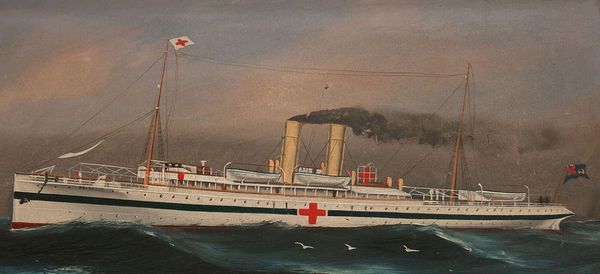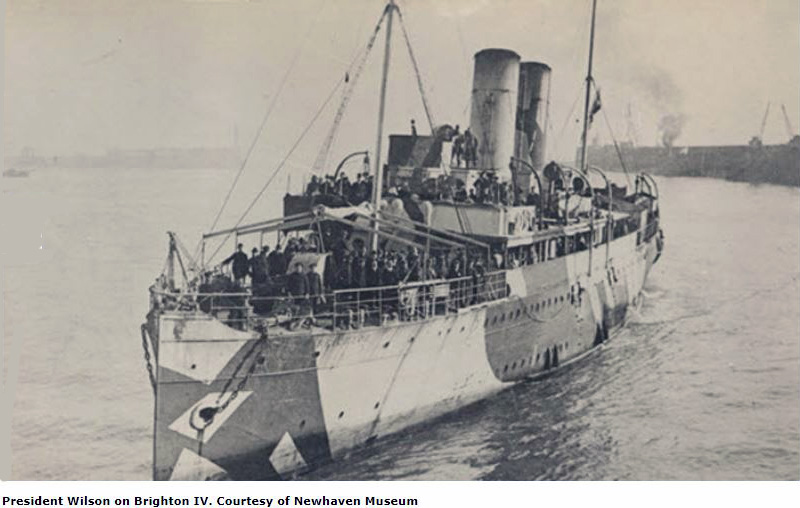Difference between revisions of "HMHS Brighton"
From Our Contribution
| (10 intermediate revisions by the same user not shown) | |||
| Line 1: | Line 1: | ||
| − | {{Infobox | + | {{Infobox ship |
| − | | | + | | image = [[File:HMHS_Brighton.jpg|border|600px]] |
| − | + | | caption = courtesy en.wikipedia.org | |
| − | + | | image2 = [[File:HMHS_Brighton_2.jpg]] | |
| − | |||
| − | |||
| − | |||
| − | |||
| − | | caption = | ||
| − | | | ||
| caption2 = | | caption2 = | ||
| − | + | | shipname = HMHS Brighton | |
| − | | | + | | shipowner = London, Brighton and South Coast Railway |
| − | + | | shipbuilder = W Denny & Bros, Dumbarton | |
| − | + | | shipyardnumber = 683 | |
| − | + | | shiplaunched = 13 Jun 1903 | |
| − | | | + | | shipcompleted = August 1903 |
| − | + | | shipinservice = | |
| − | | | + | | shipoutofservice = 25 Aug 1933 |
| − | | | + | | shipinservice2 = |
| − | + | | shipoutofservice2 = | |
| − | | | + | | shipreclassified = |
| − | | | + | | shipID = VDWN |
| − | + | | shipfate = wrecked | |
| − | | | + | | shiptype = steamship cross channel ferry |
| − | | | + | | shiptonnage = 1,384 tons |
| − | + | | shiplength = 273 ft 6 in (83.36 m) | |
| − | + | | shipbeam = 34 ft 2 in (10.41 m) | |
| − | | | + | | shipdepth = 14 ft 1 in (4.29 m) |
| − | + | | shippropulsion = triple screw | |
| − | | | + | | shipspeed = 21 knots (38.89 kmph) |
| − | | | + | | shipcapacity = 149 patients as a hospital ship |
| − | |||
| − | | | ||
| − | | | ||
}} | }} | ||
| Line 40: | Line 31: | ||
Owned by London, Brighton and South Coast Railway before and after her WW1 service. Used on the Newhaven - Dieppe route. | Owned by London, Brighton and South Coast Railway before and after her WW1 service. Used on the Newhaven - Dieppe route. | ||
| − | |||
| − | Brighton carried the American President Woodrow Wilson back to Dover after the signing of the Treaty of Versailles. | + | In 1914, ''Brighton'' was requisitioned by the Royal Navy for use as a troopship. She was later used as a hospital ship. On 19 Dec 1914, she rescued the survivors of the naval trawler ''HMT Orianda'', which had been sunk by a mine in the North Sea off Scarborough, Yorkshire. Brighton carried the American President Woodrow Wilson back to Dover after the signing of the Treaty of Versailles. |
| − | In 1930, Brighton was sold to | + | |
| + | In 1930, ''Brighton'' was sold to W. E. Guinness, who converted her to a private yacht named ''Roussalka''. Her steam turbines were replaced by a diesel engine and one of her two funnels was removed. On 25 August 1933, in thick fog, ''Roussalka'' was wrecked on Blood Slate Rock, Freaklin Island, Killary Bay. All passengers and crew were rescued. | ||
==Soldiers carried== | ==Soldiers carried== | ||
| − | ==France to England 11 June 1916== | + | ===France to England 11 June 1916=== |
*[[John Alexander Spilsbury]] | *[[John Alexander Spilsbury]] | ||
| − | ==Calais, France to England 1 Aug 1916== | + | ===Calais, France to England 1 Aug 1916=== |
*[[Alfred Warburton Chapman (Jnr)]] | *[[Alfred Warburton Chapman (Jnr)]] | ||
| − | = | + | ===Calais to England 12 August 1916=== |
| − | |||
| − | |||
| − | ==Calais to England 12 August 1916== | ||
*[[Ivor Trehane Birtwistle]] Post WW1 men | *[[Ivor Trehane Birtwistle]] Post WW1 men | ||
| − | ==Calais to England 20 August 1916== | + | ===Calais to England 20 August 1916=== |
*[[Francis Crowe]] | *[[Francis Crowe]] | ||
| − | ==Calais to England 21 August 1916== | + | ===Calais to England 21 August 1916=== |
*[[Walter David Francis Kerridge]] | *[[Walter David Francis Kerridge]] | ||
| − | ==Calais to England 1 September 1916== | + | ===Calais to England 29 August 1916=== |
| + | *[[William Stephens]] | ||
| + | |||
| + | ===Calais to England 1 September 1916=== | ||
*[[Matthew Harwood]] | *[[Matthew Harwood]] | ||
| − | ==5 June 1917== | + | ===Calais to England 5 June 1917=== |
*[[Thomas Albert Leslie Cheney]] | *[[Thomas Albert Leslie Cheney]] | ||
| + | |||
| + | ===Calais to England 25 Jul 1917=== | ||
| + | *[[William John Bennett]] | ||
| + | |||
| + | ===France to England 23 Sep 1918=== | ||
| + | *[[Bernard O'Reilly]] | ||
| + | |||
| + | ===Calais, France to England 22 Oct 1917=== | ||
| + | * [[Edward Joseph King]] | ||
[[Category:Ships]] | [[Category:Ships]] | ||
Latest revision as of 14:32, 9 January 2023
Contents
- 1 Remarks
- 2 Soldiers carried
- 2.1 France to England 11 June 1916
- 2.2 Calais, France to England 1 Aug 1916
- 2.3 Calais to England 12 August 1916
- 2.4 Calais to England 20 August 1916
- 2.5 Calais to England 21 August 1916
- 2.6 Calais to England 29 August 1916
- 2.7 Calais to England 1 September 1916
- 2.8 Calais to England 5 June 1917
- 2.9 Calais to England 25 Jul 1917
- 2.10 France to England 23 Sep 1918
- 2.11 Calais, France to England 22 Oct 1917
Remarks
Owned by London, Brighton and South Coast Railway before and after her WW1 service. Used on the Newhaven - Dieppe route.
In 1914, Brighton was requisitioned by the Royal Navy for use as a troopship. She was later used as a hospital ship. On 19 Dec 1914, she rescued the survivors of the naval trawler HMT Orianda, which had been sunk by a mine in the North Sea off Scarborough, Yorkshire. Brighton carried the American President Woodrow Wilson back to Dover after the signing of the Treaty of Versailles.
In 1930, Brighton was sold to W. E. Guinness, who converted her to a private yacht named Roussalka. Her steam turbines were replaced by a diesel engine and one of her two funnels was removed. On 25 August 1933, in thick fog, Roussalka was wrecked on Blood Slate Rock, Freaklin Island, Killary Bay. All passengers and crew were rescued.
Soldiers carried
France to England 11 June 1916
Calais, France to England 1 Aug 1916
Calais to England 12 August 1916
- Ivor Trehane Birtwistle Post WW1 men

